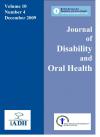Journal of Disability and Oral Health

- Cover Date:
- December 2009
- Print ISSN:
- 1470-8558
- Vol:
- 10
- Issue:
- 4
BSDH Guidelines
The provision of oral health care under general anaesthesia in Special Care Dentistry. A professional consensus statement. A document produced by the British Society for Disability and Oral Health
Guidelines for the Delivery of a Domiciliary Oral Healthcare Service Increased life expectancy, a significant growth in the proportion of older people in the population, and more people remaining dentate into old age are factors that have compounded to increase the need for domiciliary oral healthcare. Thus, the revision of the BSDH guidelines for DOHC is timely. The guidelines were launched by Mr Barry Cockcroft (Chief Dental Officer for England) on 19 August 2009 in a care home in Poole (Dorset), an area of England with a high population of older people. A number of PCT commissioners were also present at the launch. Domiciliary oral healthcare (DOHC) is a service that reaches out to care for those people who cannot reach the service themselves. It is intended to include oral health care and dental treatment carried out in an environment where a patient is resident either permanently or temporarily, as opposed to that care which is delivered in dental clinics or mobile units. It normally includes residential units, nursing homes, hospitals, day centres and patients’ own homes. The purpose of the guidelines is threefold: 1. To alert commissioners and service providers to the need for maintaining and increasing the availability of Domiciliary Oral Healthcare Services (DOHCS) 2. To provide guidance for the commissioning of high quality DOHCS, and 3. To provide guidance to establish standards for the delivery of high quality DOHCS The guidelines point out that domiciliary care should not be the last resort. It should be offered amongst the routine options for dental care for people who are mostly confined to home or for whom leaving or travelling from home can cause unwarranted upheaval and distress. However, access to, and availability of, dental domiciliary services is relatively low, with less than 40% of dentists in general dental practice in England providing any home visits. Additionally, some of these dentists restrict their domiciliary practice to prosthodontics, and a proportion restrict it further to complete dentures only. The guidelines make the case of need for DOHCS and are intended to provide advice and support for all those involved with its commissioning and provision in order to maintain and improved its availability. The document provides guidance on assessing, planning and delivering DOHCS, with suggestions about appropriate equipment and its availability. The requirements for adequate training and more opportunities to gain experience to develop the necessary knowledge and skills, as well as, appropriate remuneration to reflect the additional time and effort required for DOHC are highlighted. Dr Janice Fiske, October 2009
- Article Price
- £15.00
- Institution Article Price
- £
- Page Start
- 193
- Page End
- 193
- Authors
Articles from this issue
- Title
- Pg. Start
- Pg. End
- An audit of a protocol for the management of patients with hereditary bleeding disorders undergoing dental treatment
- 151
- 155
- Parental perceptions of oral health and access to oral health care services for children with special educational needs in South Bedfordshire
- 156
- 160
- Frequency and distribution of gingival bleeding in a population of para-athletes competing at the III Para-Pan-American Games in Rio de Janeiro 2007
- 163
- 168
- Retrospective audit of the prescribed systemic medication taken by adults using Salaried Primary Care Dental Services in Warwickshire and implications for dental care
- 169
- 174
- The knowledge and attitudes of North Wales healthcare professionals to bisphosphonate associated osteochemonecrosis of the jaws
- 175
- 183
- Strategies for the prevention of dental caries in people with disabilities: a review of risk factors, adapted preventive measures and cognitive support
- 184
- 192
